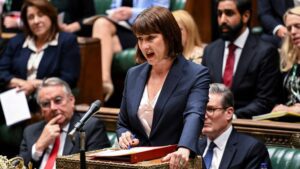Rachel Reeves, the Chancellor, has been cautioned that “significant action” is necessary to stabilise the UK’s public finances, according to a report from the Organisation for Economic Co-operation and Development (OECD).
The report calls for an overhaul of the fiscal regime, including scrapping stamp duty and scaling back the pension triple lock, as the government faces mounting spending pressures driven by rising health, pension, and climate change costs.
The OECD, representing 38 advanced economies, highlighted that these challenges come on top of the UK’s existing fiscal difficulties of high debt, rising interest payments, and sluggish economic growth, all of which contribute to increasing borrowing costs over time. This warning from the OECD adds to the growing concerns about the UK’s debt trajectory, following a recent forecast by the Office for Budget Responsibility that debt could reach 270% of GDP within 50 years due to escalating healthcare and pension expenditures.
In her upcoming budget on October 30, Reeves is expected to address approximately £22 billion of government overspending, with potential tax hikes being considered. The OECD’s report suggests that the costly pension triple lock should be scaled back, proposing that pension entitlements rise in line with an average of inflation and wage growth, rather than the current system where pensions increase by the highest of 2.5%, inflation, or pay growth. The International Monetary Fund has similarly recommended curbing the generosity of the triple lock to help contain costs.
The OECD emphasised that “significant action is needed to stabilise public debt over the longer term,” calling for a fairer and more efficient tax system. It also recommended increasing public investment, which may require adjustments to the fiscal rules. Currently, public investment is treated the same as current spending, often resulting in insufficient funding for productivity-enhancing projects due to budget constraints. The OECD argued for a reallocation of resources to boost public investment, enhancing the country’s long-term growth prospects.
Among its key recommendations, the OECD suggested abolishing stamp duty—a tax on property sales—which it argued hinders people from moving to pursue better job opportunities or downsizing in retirement, thus disrupting the housing market. The report also advised unfreezing fuel duty, simplifying the income tax system, and limiting the amount of interest expenses that companies can deduct from their taxes. Additionally, the OECD proposed updating the property valuations used to determine council tax, which in England are still based on 1991 values.
The UK’s debt has surged from around 35% of GDP sixteen years ago to nearly 100% today, driven by a series of economic shocks, including the 2008 financial crisis, the pandemic, and the recent energy price surge. While there is no set debt level that automatically triggers a financial crisis, economists warn that debt becomes unsustainable when interest payments outpace economic growth—a scenario currently affecting the UK and other developed economies. Over the next five years, about 9% of every £1 spent by the UK government will go toward debt interest costs.
During the recent general election campaign, the IMF urged both Labour and Conservative parties to avoid making promises of deep tax cuts that could undermine fiscal credibility. In response to the growing fiscal challenges, the Treasury stated: “Following the spending audit, the chancellor has been clear that difficult decisions lie ahead on spending, welfare, and tax to fix the foundations of our economy and address the £22 billion hole the government has inherited. Decisions on how to do that will be taken at the budget.”
As the budget date approaches, the pressure is mounting on the government to implement the necessary fiscal reforms to stabilise the UK’s finances, balancing the need for revenue with sustainable public spending and investment.


















